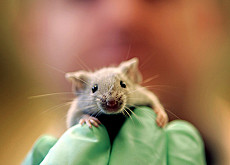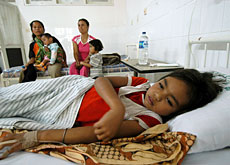Scientists pinpoint bird flu antibody

An international team of scientists, including Swiss researchers, has succeeded in immunising mice against the H5N1 bird flu virus using human antibodies.
Their findings point to a new way of neutralising infections in humans in the event that the virus mutates to spark a worldwide pandemic.
“Our research opens the possibility of applying monoclonal antibodies as therapy,” said Antonio Lanzavecchia, director of the Institute for Research in Biomedicine in Bellinzona.
“In fact the current paper demonstrates that the antibodies isolated and reproduced using our method can prevent and cure infection by H5N1 in an animal model.”
Lanzavecchia, co-author of the study, used blood taken from four Vietnamese survivors of the H5N1 virus to create large amounts of antibodies that dramatically increased the survival rate of infected mice.
Out of 60 mice infected with a lethal does of the virus, 58 survived after receiving antibodies. The antibodies protected mice as late as 72 hours after infection and worked against two different strains of H5N1.
The H5N1 virus has killed 186 people out of 307 infected since 2003, according to the Geneva-based World Health Organization.
Virus levels
Further tests showed that mice receiving antibodies had levels of virus in the lungs that were a tenth to a hundredth the level of those in control mice, all of which died within a week.
“If the success of this initial study is confirmed through further laboratory and clinical trials, human monoclonal antibodies could prove to be valuable therapeutic and prophylactic public health interventions for pandemic influenza,” said Anthony Fauci, head of the National Institute of Allergy and Infectious Diseases (NIAID) in the United States.
Swiss researchers worked on the study alongside colleagues at the NIAID and the Hospital for Tropical Diseases in Vietnam.
Scientists say more tests are needed but if the research pans out, it could be possible to stockpile the antibodies as an additional way to treat or prevent H5N1 alongside Tamiflu and other antiviral drugs.
The technique of using antibodies taken from human blood for treating or preventing infections, known as passive immunotherapy, is not new.
According to the study, published in the online journal PloS Medicine, the transfusion of human blood products from patients recovering from the 1918 Spanish flu pandemic was associated with a 50 per cent reduction in influenza mortality.
Reacting to the study, the WHO said it was too early to gauge the importance of the findings.
swissinfo with agencies
Last month the government urged the public to stock 50 protective masks in the event of a bird flu pandemic.
Switzerland is due to start taking delivery early this summer of eight million doses of a pre-pandemic vaccine.
Antibodies are immune system proteins that recognise and help orchestrate an immune attack on bacteria, viruses and parasites.
Monoclonal antibodies are specially engineered to attack a certain protein – in this case, one found in H5N1.

In compliance with the JTI standards
More: SWI swissinfo.ch certified by the Journalism Trust Initiative










You can find an overview of ongoing debates with our journalists here . Please join us!
If you want to start a conversation about a topic raised in this article or want to report factual errors, email us at english@swissinfo.ch.